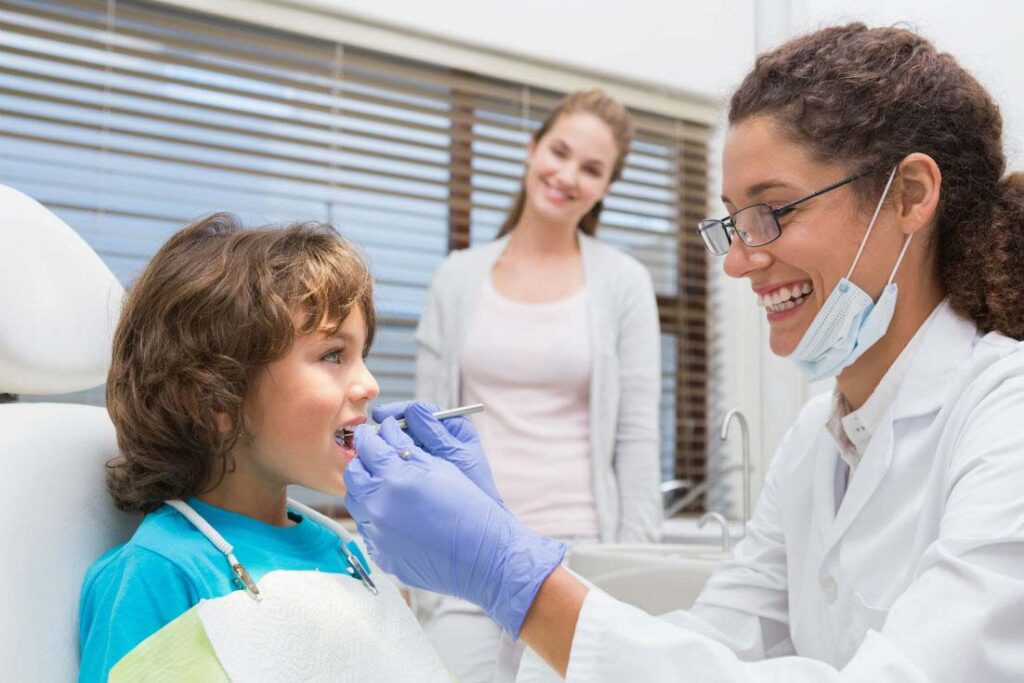Pediatric Dentistry – Facts to Consider

Did you know that babies’ teeth start to develop before they’re even born? However, the baby teeth are not visible until they’re at least 6 months old. As the infant matures, more teeth will develop until the child has a full set of baby teeth (typically around the age of 3).
Within a few years, these baby teeth will begin to fall out in order to make room for adult teeth!
Perhaps you have a little one or you are interested in learning more about pediatric dentistry? We’ll be reviewing some dental health facts for kids below.
Pediatric Dentistry: 8 Children Dental Facts That You Should Know About
Here are some important things to keep in mind regarding your child’s dental health.
1. Tooth Decay Is the Most Common Childhood Disease
Tooth decay is the most prevalent harmful dental condition among children. When untreated, tooth decay will destroy a child’s teeth and have a lasting impact on their overall health.
According to the CDC, more than 42% of children between ages 2 to 11 will have a cavity. Even more startling, cavities are 5 times more common than childhood asthma and 20 times more common than diabetes.
2. Cavities Are Preventable
Cavities might be common, but that certainly doesn’t mean you can’t prevent them.
In particular, fluoride is capable of preventing and reversing early stages of tooth decay. How does it work? Once ingested, fluoride plays a role in strengthening developing teeth. The fluoride is taken to the developing teeth, where it helps reinforce the enamel (the protective layer on the teeth). Reinforced enamel is much more resistant to tooth decay. It is important to keep in mind, however, that fluoride is not capable of repairing cavities.
3. Candy Is Not the Only Cause of Poor Dental Health
There is no doubt that eating candy can certainly lead to cavities. However, it’s not the only thing that’s responsible. Looking at the big picture, many different types of food can cause tooth decay. In particular, starchy snacks such as cookies, crackers, or bread, can increase a child’s likelihood of developing cavities. This should not be too surprising, After all, tooth decay is caused by acid-producing bacteria that consume carbohydrates. In other words, cavities result from microorganisms that feast on the sugars from starchy foods. After eating these foods, it’s important to brush your child’s teeth.
4. Children Should Go to the Dentist by the Time They’re One Year Old
Most children don’t see a dentist until they are over 2 years old! This is much later than recommended by dental professionals. According to the American Academy of Pediatric Dentistry, you should bring your child in for a dental appointment by the time they are one year old.
It is important to remember that baby teeth are crucial for several reasons. Not only do they help children chew, which is necessary for good nutrition, but baby teeth also play a significant role with speech development. You should not forget that baby teeth help save space for permanent teeth, so taking care of them should be a top priority!
5. It’s Important to Care For Your Baby’s Teeth From the Start
Proper dental care is important from the start—even before your child has any teeth. You should use an infant toothbrush or soft cloth to wipe your baby’s gums twice a day before their teeth erupt. This will keep their gums free of bacteria and prepare them for toothbrushing.
Once the baby teeth develop and become visible, you’ll want to brush them regularly with a fluoride toothpaste. Ideally, you want to brush them twice a day—in the morning and at night.
6. It’s Possible for a Child to “Catch” Cavities From Their Mother
Believe it or not, a child can actually “catch” cavities from their mother. In fact, 71% of tooth decay cases are caused by the transmission of bacteria from a mother to her infant. The primary culprit is Streptococcus mutans, a strain of bacteria that is passed through the transfer of saliva. This means that blowing on food, sharing utensils, and even kissing, can indirectly cause cavities.
With this in mind, it’s important for mothers to maintain proper dental hygiene. The better their oral care, the smaller the chance of their baby having dental problems.
7. Cavities Can Affect a Child’s Self-Esteem and Academic Performance
Cavities not only affect a child’s oral health, but they can also have an impact on their self-esteem. It’s not uncommon for children with dental issues to fall victim to bullying. Many of these children often find themselves embarrassed to smile in front of their friends and reluctant to participate in social activities. Statistics show that tooth decay can also affect a child’s academic performance. In the United States, it’s estimated that nearly 51 million school hours are lost every year due to illnesses relating to dental problems!
8. Sports Can Cause Dental Injuries
Children who participate in sports generally have a higher risk of dental injuries. Cracked teeth and fractured roots are two most common sports related dental injuries. Recent studies have shown that basketball has the highest injury rate due to collisions with other players and hand contact. Due to the frequent nature of these dental injuries, it’s vital that your little athlete wears proper sports gear during their activities.
Proper Dental Care Goes a Long Way
As you can see, there are several things to keep in mind when it comes to pediatric dentistry. Above all, it’s important to remember that it’s never too early to begin proper dental care. Cavities are the most common disease in children!
Looking for a dentist that provides pediatric dental services in the Brentwood area? Feel free to contact us to make an appointment!
